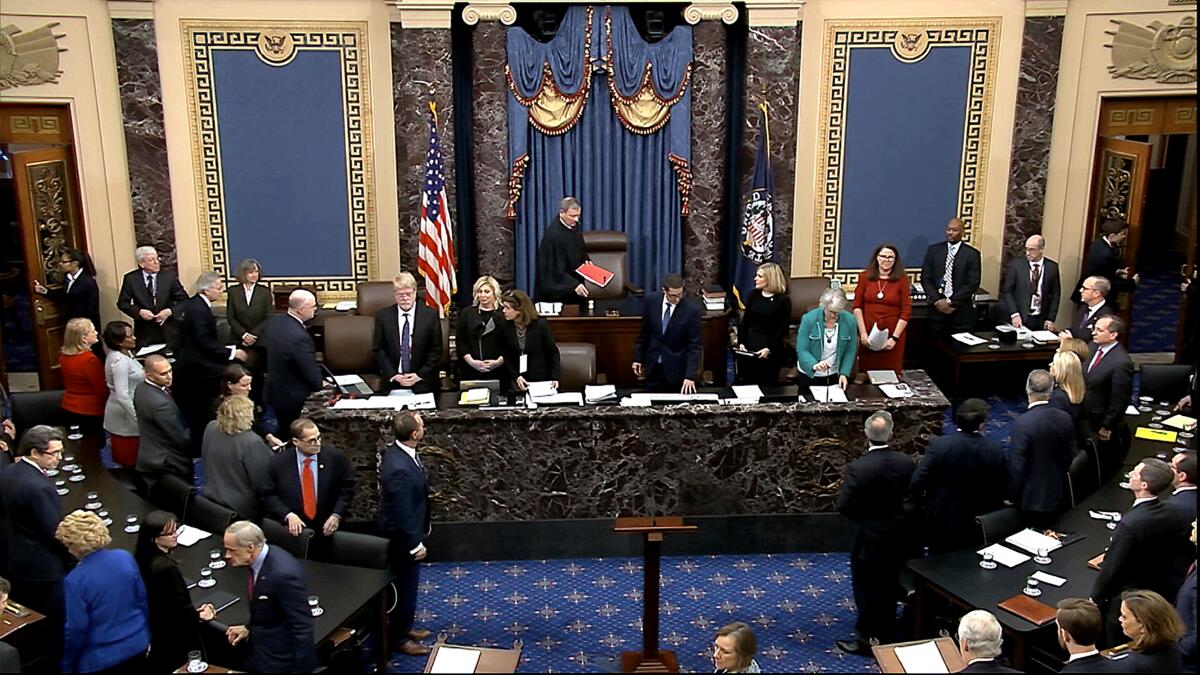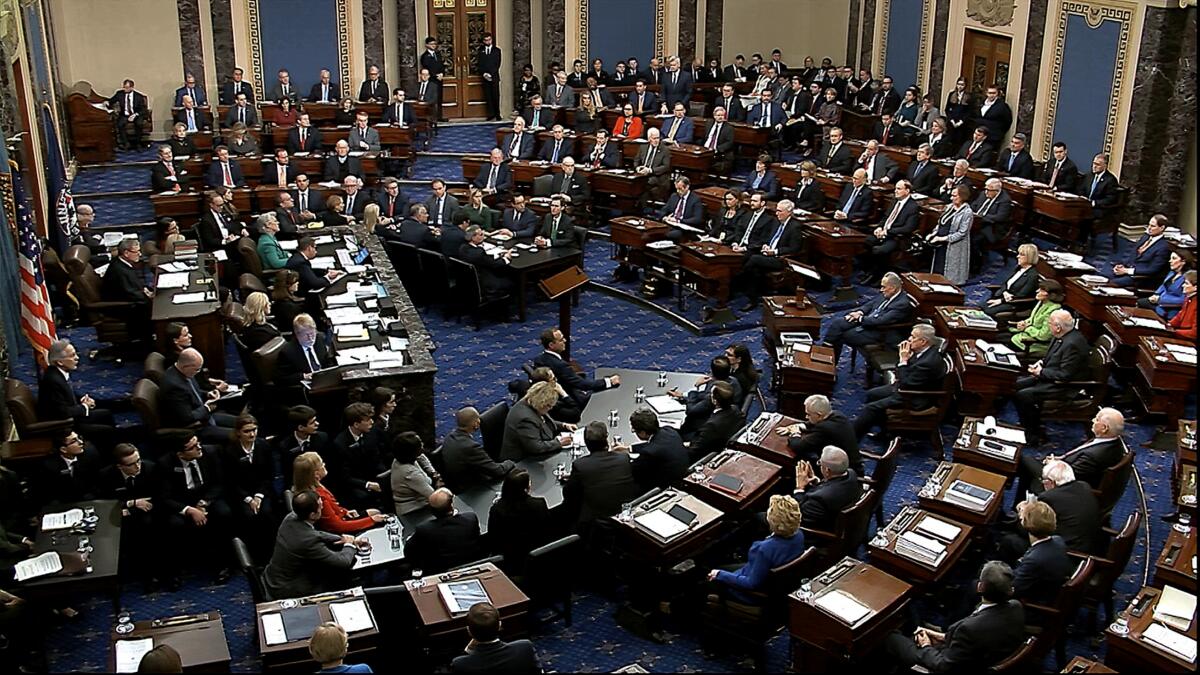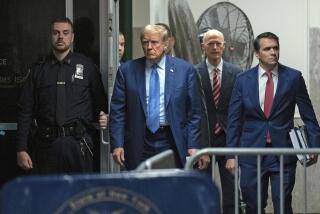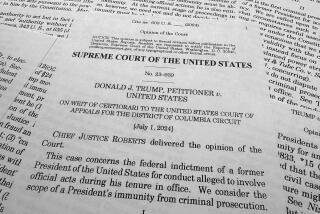Op-Ed: Trump’s acquittal has stripped a crucial constitutional check of all meaning

- Share via
The impeachment process in the House and the Senate has come to a totally predictable conclusion and President Trump has not been removed from office. My great fear is that the wrong lessons will be drawn from this and will have dire consequences for the future:
Trump did nothing wrong. Trump continues to claim that his shakedown call with Ukrainian President Volodymyr Zelensky was “perfect” and he sees the Senate’s decision as full exoneration.
But the president used the powers of his office to his personal political advantage. As acting White House Chief of Staff Mick Mulvaney said, and as many confirmed, it was a quid pro quo. It is wrong for presidents to use their powers in this way. The Senate vote should not be taken as an acquittal, exoneration or as approval of this conduct; it is a partisan choice by the Republican Party to stick with their president.
A president should not be impeached in the last year of a term. Trump’s supporters repeatedly criticized the impeachment effort as an attempt to undo the 2016 election and said that it is wrong to impeach a president facing reelection.
Of course, any impeachment is removing a president who has been elected. The Framers could have written into the Constitution that a president could be removed from office for “treason, bribery, and other high crimes and misdemeanors except in an election year.” But they did not.
A president can ignore congressional subpoenas with impunity. Trump refused to comply in any way with all congressional subpoenas and directed his aides to ignore them. This was the basis for the second article of impeachment.
Every past president facing an impeachment inquiry — Andrew Johnson, Richard Nixon and Bill Clinton — complied with subpoenas, although they also fought narrower battles over executive privilege. Supreme Court precedents establish broad authority for Congress to issue subpoenas as part of its checks and balances oversight duty. In the future, Congress will need to consider using its now-dormant inherent contempt power, which involves Congress directly imposing sanctions on the failure to comply with subpoenas.

Meeting the “high crimes and misdemeanors” standard requires a criminal act. This was the central argument made by Trump’s defenders in the Senate. The claim was that absent a crime, a president cannot be removed from office.
This argument is ahistorical and indefensible as a matter of constitutional law. The phrase “high crimes and misdemeanors” comes from English law, where it was used to remove officials for abuses of power. The Framers, including Alexander Hamilton in Federalist No. 65, was clear that this phrase referred to and allowed for impeachments when there were serious abuses of power. Supreme Court Justice Joseph Story in his “Commentaries on the U.S. Constitution” in 1833 said this explicitly. Andrew Johnson was impeached for an abuse of power that was not a crime. But most important, there must be a way to remove a president who seriously abuses the power of the office.
The Senate trial does not need to be a real trial and senators don’t need to be impartial jurors. The Senate refused to call witnesses in Trump’s impeachment, even when there was potentially important new evidence such as national security advisor John Bolton’s book manuscript. Senators told the world how they would vote before the trial even began, despite their oath to be “impartial.”
Oaths matter. Every prior impeachment trial of a president involved witnesses. The refusal to call them should not be seen as a matter of constitutional principle, but a political choice by Republicans to not risk public disclosure of evidence that would be harmful to their president.
Whatever the president thinks is in the public interest cannot be an impeachable offense. This is what lawyer Alan Dershowitz said in Trump’s defense: “Every public official that I know believes that his election is in the public interest, and mostly you’re right. Your election is in the public interest, and if a president does something which he believes will help him get elected in the public interest, that cannot be the kind of quid pro quo that results in impeachment.”
This is akin to Nixon saying that if the president does it, it cannot be illegal. It is a frightening proposition that would allow a president to do virtually anything to help his reelection bid while asserting that his staying in office is in the public interest. Although Dershowitz later said he did not mean to imply that presidents have unlimited powers, in the future his words will be quoted to support exactly that view.
The Trump impeachment reflects a country that is deeply polarized and it has exacerbated these divisions. Democrats overwhelmingly favored impeachment and removal; Republicans with equal fervor opposed it. The lesson we should draw from it is that this deep partisan divide must be healed or the nation may not survive.
I fear, however, that the impeachment’s strongest message for future presidents, especially those whose party holds a majority in the Senate, is almost the opposite: They need not fear impeachment and removal, almost no matter what they do.
A crucial constitutional check on the president has been rendered largely meaningless by the Trump impeachment. And this should be a frightening lesson for all of us.
Erwin Chemerinsky is dean of the UC Berkeley School of Law and a contributing writer to Opinion.
More to Read
A cure for the common opinion
Get thought-provoking perspectives with our weekly newsletter.
You may occasionally receive promotional content from the Los Angeles Times.










